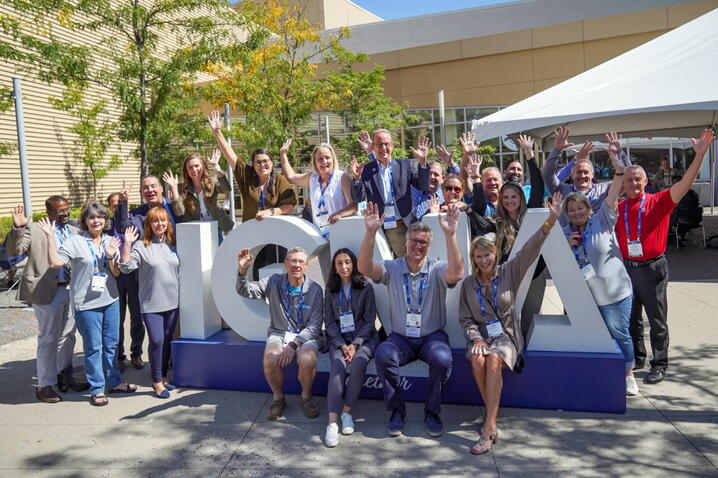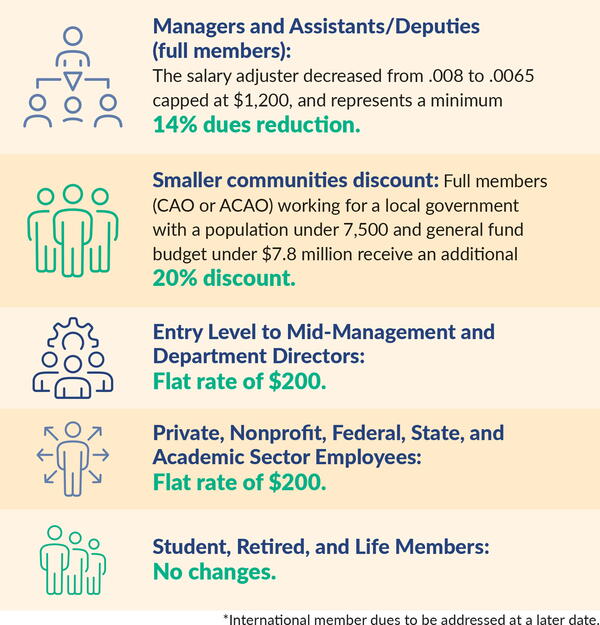The New ICMA Membership Dues Structure: Creating More Value for Members

Years in the making, the reimagined dues structure offers greater affordability, which will contribute to member satisfaction and membership growth.
by Martha Perego, ICMA-CM | | PM MAGAZINE – ARTICLE
Considering Future Growth
At the October 2019 ICMA Executive Board meeting in Nashville, ICMA’s leadership was wrestling with an issue that had long been plaguing board members. What would it take to grow ICMA membership? How could ICMA attract even more passionate and committed city, county, and town managers, assistants, and others aspiring to those roles?
While members placed a high value on their ICMA membership, some believed the dues were too expensive. At state association meetings, nonmembers often described the dues as their main barrier to joining. Though everyone at the board meeting said they had heard these concerns raised in the past, the board recognized that this was anecdotal information. The most important next step would be to get actual data and explore more deeply how dues affected various segments of prospective, former, and current members.
Breaking with the past tradition of establishing a member task force, ICMA looked for outside expertise. “We hired an external consultant with several decades of experience in helping other associations. The consultants guided us through the process of surveying members and conducting focus groups and interviews across all our membership segments,” said Troy Brown, outgoing ICMA president and city manager of Moorpark, California.
The consultant, McKinley and Partners, kicked off the project in November 2020. Nearly 3,000 surveys were completed and analyzed, helping ICMA staff to better understand how member benefits are perceived and valued. They also looked at how the dues structure could be improved to allow more individuals to join and to create an even greater sense of satisfaction for existing members.
Member Research Points to Gaps
The research results continue to reflect the high regard that respondents have for ICMA, most specifically its networking and professional development offerings. The overall satisfaction rate of 85% with ICMA is significantly higher than other professional associations, which average 78% member satisfaction levels. However, 45% of respondents disagree that membership pricing is reasonable. To compare how ICMA members feel versus members of other professional organizations, the average “cost to value of membership” for professional organizations is 33%. ICMA rated 29%.
A significant number of comments in the focus groups centered on the lack of affordability for communities with small budgets and/or populations under 7,500. “For small town managers, you have priced them out,” one respondent said. In considering a range of different dues models, “ability to pay” was a preferred approach for the CAO/ACAO segment with salary continuing to be a reasonable metric.
With this data in hand, the committee wanted to better understand the financial constraints of small communities. “I have worked in small communities for almost my entire career,” said Board Member Teresa (Terri) Tieman, assistant city manager of Bethany Beach, Delaware, who served on the dues subcommittee. “I can’t tell you the number of times that I have tapped into ICMA resources to solve a problem, find a vendor, learn the best way to on-board a new councilmember, or to find sample policies. We recently used a policy I found on icma.org to develop our teleworking policy. We didn’t have one pre-COVID. I have literally saved my communities thousands in consulting fees, so I was really excited that one outcome [of the dues subcommittee] would be to help ICMA become more inclusive of small communities.”
Options Explored
Given that charge, an ICMA staff team under the leadership of Patricia Vinchesi, Northeast regional director, studied a total of 6,000 communities and 250 counties across the United States with an eye toward potential discounts based either on population, budget, or a combination of both. Based on the analysis, the team found among other things that neither population nor budget size is the sole factor for determining ability to pay.
The team looked at a number of financial options that focused, according to Vinchesi, on “being meaningful enough that there would be a substantial reduction from the previous cost of membership to join and an amount that would be within reach of municipal budgets so managers could make an effective ROI case to their elected officials.” Vinchesi too worked in small communities prior to her tenure at ICMA. She recalls reaching for ICMA resources or calling on her ICMA network when her town demanded an analysis and recommendation with no budget and limited time.
Building on Past Dues Improvements
Previous boards have recognized that ICMA’s dues structure is a serious and complicated matter since dues help fund member benefits and keep the association solvent. Prior task forces took steps to align ICMA dues with organizational priorities. Past task forces established a dues cap of $1,400, a flat rate for early to mid-career professionals, and a $200.00 dues rate for department directors to help attract and develop next-generation leaders. These adjustments, along with benefit enhancements, have succeeded in growing ICMA’s membership.
Options for a new dues structure were modeled by ICMA’s Chief Finance Officer Sabina Agarunova and her team and reviewed by the board finance and member committees. The final recommendation reflects a careful balance of forecasting member growth in the years ahead versus the reduction in revenues from the lower cost of dues in the immediate future. “The work of the ICMA staff in support of this effort was tremendous and it reflects a strong belief in the outcome,” Tieman said.
Fellow Board and Dues Committee Member Michael Kaigler, assistant county manager of Chatham County, Georgia, agrees. “This makes membership more affordable for individuals in smaller jurisdictions who may not have access to the resources to deal with today’s complicated issues and who need ICMA resources the most. It marks the first time in the history of the organization where the cost of membership overall was lowered. I am most proud of the work we accomplished to address the value of membership through the dues process.”
The New Dues Structure
The new dues structure is effective beginning October 1, 2022.* You can see the full structure here. Here is a summary:

Sample CAO/ACAO Member Cases
The ICMA membership team put together some hypothetical member cases to demonstrate the new dues structure in action.
Manager from a Mid-size City
Salary: $200,000
Old dues structure: She would pay $1,400 (.008 of salary capped at a maximum payment of $1,400).
New dues structure: The rate has been reduced to salary times .0065 and is now capped at $1,200. She would now pay $1,200 and realize a savings of $200.
Assistant Manager from a Large County
Salary: $150,000
Old dues structure: He would pay $1,200 (.008 of salary capped at a maximum payment of $1,400).
New dues structure: The rate has been reduced to salary times .0065 and is now capped at $1,200. He would now pay $975 and realize a savings of $225.
Manager from a Small Community (population of 7,500 and a general fund budget of $7.8 million)
Salary: $135,000
Old dues structure: He would pay $1,080 (salary times .008 capped at a maximum payment of $1,400).
New dues structure: The rate has been reduced to salary times .0065 and is now capped at $1,200. In addition, because the community meets the qualifications for ICMA’s new small community discount, he will receive an additional 20% discount on his dues. His new dues rate is $702—a savings of $378.
Manager from a Small Community
Salary: $105,000
Old dues structure: She would pay $840 (salary times .008 capped at a maximum payment of $1,400).
New dues structure: The rate has been reduced to salary times .0065 and is now capped at $1,200. In addition, because her community meets the qualifications for ICMA’s new small community discount, she will receive an additional 20% discount on her dues. Her new dues rate is $546—a savings of $294.
Dues Committee
“This monumental task could not have been accomplished without the dedication of the dues subcommittee. These board members met frequently, and this assignment was extremely labor intensive,” praised Brown. “We knew it would be a multi-year project, but we didn’t know it would be done during a pandemic, which made everything a little more complicated,” he added. “On behalf of all the members, I’d like to thank the ICMA staff, especially the membership and finance teams, and the dues subcommittee members for getting us across the goal line.”
Co-chairs:
Laura A. Fitzpatrick, deputy city manager, Chesapeake, Virginia
Ray Gonzales, former county manager, Adams County, Colorado
Michael Kaigler, assistant county manager, Chatham County, Georgia
Members:
Molly Mehner, deputy city manager, Cape Girardeau, Missouri
Teresa Tieman, town manager, Fenwick Island, Delaware
Peter Troedsson, city manager, Albany, Oregon
What You Need to Do
Join or renew! Current members will receive renewal invoices that will reflect the dues changes as applicable. New members joining after October 1, 2022, will receive the new dues rates as applicable. If you have questions about your invoice, contact membership@icma.org.
Current members: please update your ICMA member profile to ensure we have the latest, most accurate information for you. Click on “My ICMA” at the top right of the icma.org homepage to update your profile and to manage your communication preferences.

MARTHA PEREGO, ICMA-CM, is director of member services and ethics director, ICMA, Washington, D.C. (mperego@icma.org).